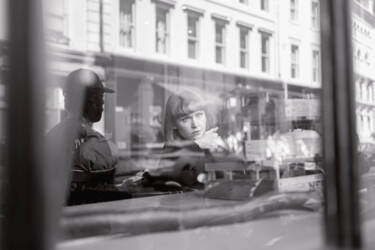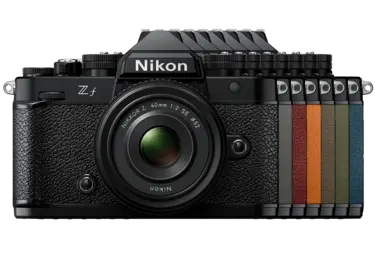Training your eye to shoot in black and white with Lucy Hamidzadeh and the Nikon Z f

Learn to see the world in tones rather than colours, and you can open up whole new areas of creativity in your images, says Lucy Hamidzadeh
Designer-turned-photographer Lucy Hamidzadeh once signed up to a photography course but, as she approached the door, she didn’t dare step in, feeling far too shy. Later, she summoned up the courage to attend an Instagrammers’ meet-up and her immersion in image-making began. Over time, she developed her own style and fell in love with the power and emotion evoked when shooting in black and white. We sat down with Lucy after her recent adventure with the Nikon Z f to discuss her street-shooting technique, her top tips on shooting in mono and, of course, her views on the amazing Z f.

Nikon magazine: Hi Lucy, so you started out with a camera, rather than using your phone?
Lucy Hamidzadeh: At first, I had a camera. I was using it, but never really understood it. I used my phone a lot, but then, as I gained more knowledge and wanted to do more things, I went back to the camera.
Did your style start to develop more then?
Absolutely. Over time, I learned how powerful the camera could be in my hands. I’m quite shy, so often stay quite away from people, but I wanted to get closer. I like being on my own, but I really like people, too, and I want to understand people. The more I understood the extent of what my camera could do, I realised I was able to get closer and closer to people.
I went on a solo photography trip to Madeira and that’s where I really fell in love with street photography. I wanted to take photos of the older people, understand them and know their story. So, I started quite far back and just got closer and closer, and realised I was learning about the world through the camera and the people I was shooting. That’s how my style developed: understanding that everyone has a story.

Do you prefer candid shots?
I love it when my subjects are not watching, because once they are aware of having their photo taken it’s like the spell is broken. I hate having my picture taken, so I understand that!
Do you mostly use the EVF or the monitor when you shoot?
I have the camera up to my eye mostly, but there are instances when I lower the camera to get different angles (such as hands). Then I use the monitor.
What lenses are your ‘go-to’ for your style?
Usually, the NIKKOR Z 50mm f/1.2 S, but I do love a NIKKOR Z 85mm f/1.2 S occasionally as well. I feel like I’m cheating with the 85mm, because you don’t have to get as close! Although, it was particularly useful during the pandemic when you couldn’t get too close to people. In terms of settings, I would open the aperture to f/1.2, ISO around 100 and then, for shutter speed, I would change it as I reacted to my subject’s movements.
Why did you start shooting in black and white?
I find it romantic. Stripping away the colour brings you into the essence of what is happening in the picture and what the story is. Of course, it doesn’t always work but, for 80% of the time, I connect more with shots in black and white than in colour. There’s a complexity that mono evokes, and yet a simplicity, too.
Do you photograph in black and white in the EVF or in colour?
I shoot in colour, but switch everything to black and white immediately in the edit. So, yes, I see it in colour first.
Is the composition different shooting in colour and then editing into black and white?
Yes. I tend to look for compositions that I think will work well in black and white. Not everything does, of course. I always look for reflections, windows with busy backgrounds, sometimes fairy lights, and I tend to play with the layers of light. I also look for textures and patterns – in clothing, skin and buildings. When I shoot hands, for example, the texture of skin is really enhanced by being in black and white.
By now, I’ve trained my eye to know what’s going to look good in black and white. A great starting point for shooting mono is to go out on a bright sunny day and look for the high-contrast areas – shoot a bright wall, and then shoot it again when it’s half blocked in shadow. Look for contrasting colours and tones that will translate well into black and white. Inevitably, you are training your eye to look for light and dark and to ignore the colours.

Are location and timings important in getting the right images?
They really are. When I’m in London, where I live, I gravitate towards Leicester Square and Covent Garden because they’re very busy and always full of people. There was a particular window I loved to shoot in Covent Garden – although, they’ve changed it now, which made me cry! I’m also more of a weekend shooter, because people are different at the weekend – more relaxed, less rushed. Recently, I went to Sicily and the people there were so warm and friendly. They didn’t care about the girl with the camera going to the market every day!
Is there much post-processing involved in your images?
Not really. I shoot RAW and in full manual. I play around a little with the highlights and shadows, add in the pure black and white and, at the end, I add a slight blue tint.

How did you get on with the Nikon Z f?
It was amazing! The look with the dials on top is classic and nostalgic, and it felt great in my hands. It also wasn’t heavy, so I shot all day. Plus it’s the sort of camera you can wear all the time. I felt quite inconspicuous with it, which I love because I want to blend in with the street. You could see it was a camera but somehow I always felt invisible. The best thing was the black and white switch on the camera, meaning I could shoot in mono in a quick switch. Shooting on the Z f was absolutely amazing. There’s no fiddling around, no losing moments, and the Nikon menu system is so easy to use. I have other cameras where it’s like you have to know a secret code to work the menu system, but with the Nikon it’s all there and really simple to use.
How did you find the different black and white modes on the Z f?
Really interesting. I shot in all three modes, and they were all so different. It’s a very good feature for anyone who isn’t used to shooting in black and white – just to see the difference those modes can make to the same shot. And when it came to editing, the deep tones were there, all really stunning.
What’s next for you?
I’m hoping to go back to Sicily soon. I love Italy – it’s the one place I always return to. I can’t wait to take the Z f there. That camera is the absolute top of my list now. It does everything you need from a full-frame camera and I love how I can go in and edit and fine-tune the colours inside the camera. It’s a beautiful looking camera, too. As soon as I saw it, I thought, “Oh, this is neat!”
Featured products
Discover the new Nikon Z f
Beauty meets power with new Nikon Z f

For limitless creativity






